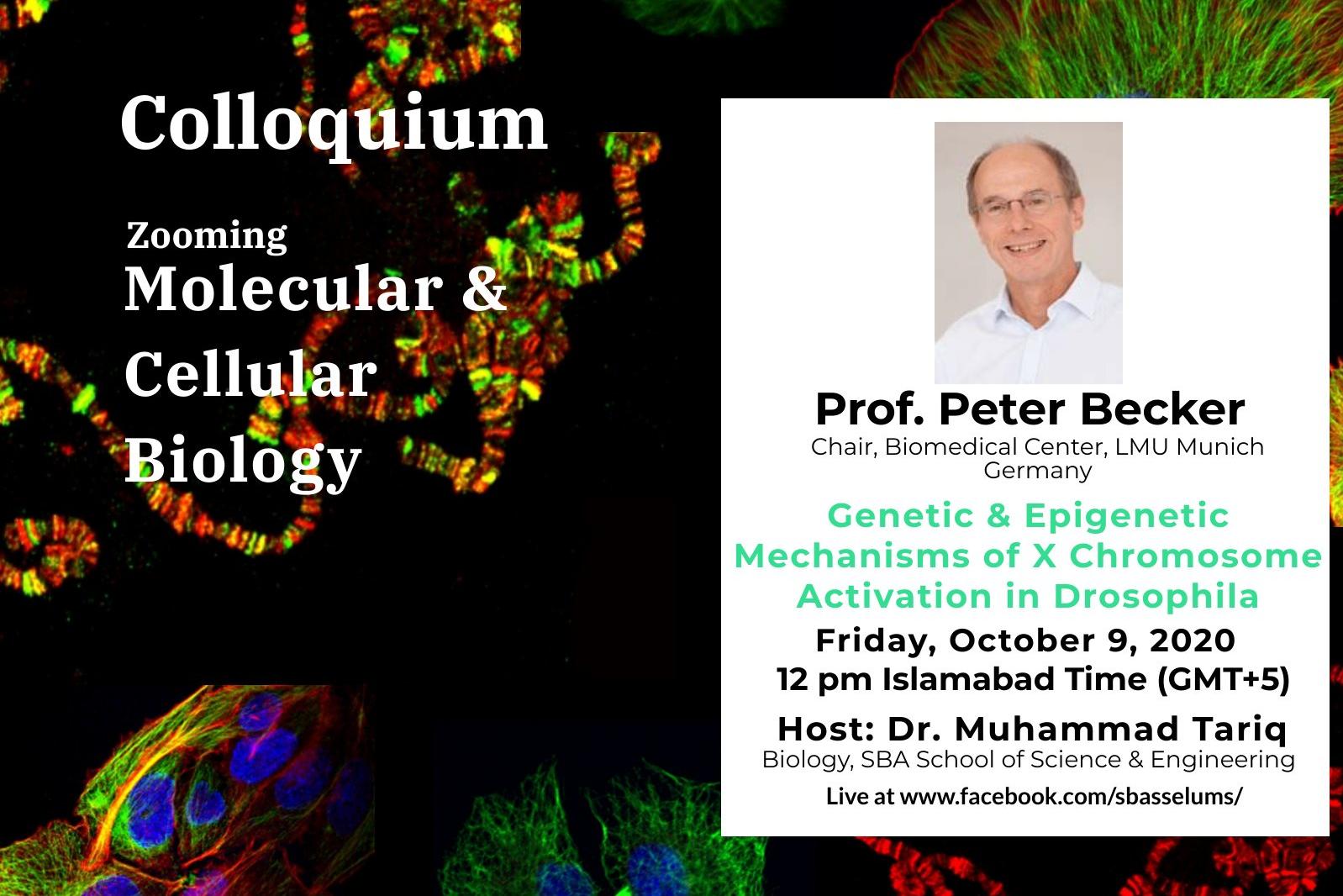
Genetic and Epigenetic mechanisms of X chromosome activation in Drosphila: “zooming Molecular & Cellular Biology”
Dosage compensation happens gradually during early embryonic development and matures along with refined chromosome folding. Key to successful dosage compensation is the property of the DCC to selectively bind the X chromosome. We continue to explore the molecular principles that allow such selective regulation. Most recently, we made significant progress in identifying and testing such principles by whole-genome chromatin reconstitution in a cell-free system.
Prof. Dr. Peter Becker from Ludwig Maximilian University of Munich (LMU) spoke in the “zooming Molecular & Cellular Biology” Colloquium on Friday 9th October at 12:00. He talked about genetic and epigenetic mechanisms how genes on single male X chromosome in flies are activated to equalize dosage of genes from two X chromosomes in females, something which is crucial for survival of organisms. In humans, we also carry a single X chromosome in males as compared to two X chromosomes in females and equalizing dosage of genes on X chromosomes is crucial for our survival because defects in such gene regulation leads to lethal consequences. In humans, we inactivate one of the two X chromosomes in females, also known as X chromosome inactivation.
About the speaker: Prof. Becker is a highly accomplished scientist and one of the finest Biochemist in the field of chromosome biology and gene regulation. Presently, he is serving as Chair of Biomedical Centre at LMU Munich. He also serves on Scientific Advisory Boards of Max Planck Institute for Molecular Biomedicine, Institute for Molecular Biology, Mainz, Biochemistry Centre Heidelberg and represent German Ministry for Education and Research in European Molecular Biology Council. He is Elected Member of the Bavarian Academy of Sciences, Elected Member of the German Academy of Science ‘Leopoldina’, Elected Member of Academia Europaea and an Elected Member of EMBO (European Molecular Biology Organization). He is recipient of Gottfried-Wilhelm Leibniz Prize, highest honour awarded in German Research, of the Deutsche Forschungsgemeinschaft and Richtzenhain-Prize for Cancer Research, DKFZ, Heidelberg. He also serves on Editorial Boards of Nucleic Acid Research, EMBO Journal, PLOS Biology, EMBO reports.
Peter Becker studies Biology at Ruprecht-Karls-Universität, Heidelberg where he received Diploma in Biology 1984. After finishing his PhD in 1987, he worked as a postdoc fellow FROM 1988-1991 with Carl Wu at NIH, Bathseda, USA. In 1996, he received Habilitation at Ruprecht-Karls Universität, Heidelberg with his mentor Prof. E. Bautz in Molecular Genetics. From 1991-1999, Peter served as group leader at European Molecular Biology Laboratory (EMBL) at Heidelberg before moving to LMU (Ludwig-Maximilians-University) Munich, where he joined as Professor and Head of Molecular Biology Division of Adolf-Butenandt-Institute, Faculty of Medicine. Presently, he is serving as Chair of Biomedical Centre at LMU Munich. Prof. Becker is an expert in the field of biochemistry and is one of the finest Biochemist in the field of chromosome biology and gene regulation. He also serves on Scientific Advisory Boards of Max Planck Institute for Molecular Biomedicine, Institute for Molecular Biology, Mainz, Biochemistry Center Heidelberg and represent German Ministry for Education and Research in European Molecular Biology Council. He is Elected Member of the Bavarian Academy of Sciences, Elected Member of the German Academy of Science ‘Leopoldina’, Elected Member of Academia Europaea and an Elected Member of EMBO (European Molecular Biology Organization). He is recipient of Gottfried-Wilhelm Leibniz Prize, highest honour awarded in German Research, of the Deutsche Forschungsgemeinschaft and Richtzenhain-Prize for Cancer Research, DKFZ, Heidelberg. He also serves on Editorial Boards of Nucleic Acid Research, EMBO Journal, PLOS Biology, EMBO reports.

